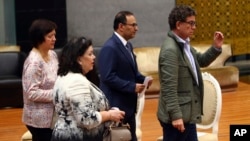A U.N. Security Council delegation on Tuesday visited Myanmar's Rakhine state, from where hundreds of thousands of Rohingya Muslims have fled military-led violence, and said they hope to help the refugees return quickly and safely to their homes.
Around 700,000 Rohingya fled the troubled area to squalid camps in Bangladesh last year as Myanmar's army launched a brutal crackdown following insurgent attacks on security posts.
State television showed the ambassadors touring the border area. They were shown reception camps where refugees who return will first be housed. They also met with members of different groups affected by the violence and upheaval, including Rakhine Buddhists, Hindus and some Rohingya Muslims who did not flee.
The ambassadors visited refugees in Bangladesh over the weekend, and on Monday with Myanmar officials, including the country's leader, Aung San Suu Kyi, and the military commander-in-chief.
At a news conference in Myanmar's capital, Naypyitaw, before flying out of the country, the ambassadors reminded Myanmar's government of its obligations as a member of the United Nations.
“The return of refugees should be in conformity with international standards,” said Kuwait's representative, Mansour Ayyad Al-Alotaibi. “It has to be safe and voluntary and dignified, without conditions, without restrictions, without any complications.”
Bangladesh and Myanmar agreed in December to begin repatriating the refugees in January, but there were concerns among rights groups and Rohingya that they would be forced to return and face unsafe conditions in Myanmar.
In its counterinsurgency sweeps in Rakhine state after the attacks last August on security personnel, Myanmar's military was accused of massive human rights violations, including rape, killing, torture, and the burning of Rohingya homes, that U.N. and U.S. officials have called ethnic cleansing.
“Basically the message we convey is it is very important to improve the security conditions for the return of the refugees, and also collaboration with the international organization, particularly the United Nations,” said Gustavo Meza-Cuadra, ambassador of Peru. “And we also mentioned the importance of the investigation regarding what happened here before the refugees went to Bangladesh.”
The U.N. refugee agency and Bangladesh recently finalized a memorandum of understanding that said the repatriation process must be “safe, voluntary and dignified. in line with international standards.”
The Security Council delegation has asked Myanmar's government to sign the memorandum.
“We believe that if the memorandum of understanding can be signed quickly and the U.N. agencies given unconditional access, that would be the best thing to do with the scale of the problem,” said Karen Pierce, Britain's ambassador to the United Nations.
Pierce parried a journalist's question about whether the U.N. should make a referral to the International Criminal Court to investigate the atrocities alleged to have been carried out by Myanmar security forces, acknowledging only that it could be one avenue of investigation.
Myanmar's government agreed to allow the delegates to visit after previously rejecting U.N. requests for a trip by a specially appointed independent fact-finding committee. The team said in March that it found evidence of human rights violations against the Kachin, Shan and Rohingya minorities “in all likelihood amounting to crimes under international law.”




